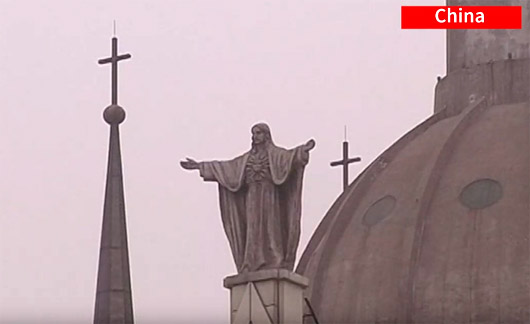Special to WorldTribune.com
UNITED NATIONS — The stunning silence of the mainstream media which often overlooks ongoing anti-religious violence has become a sad barometer of our secular societies.
Clearly, while most of the attacks are “somewhere else” be it the Middle East, Africa or South Asia, the media template seems preset to default to cover other issues.

The Holy See Observer Mission to the UN and Aid to the Church in Need co-sponsored a symposium allowing the voices of the persecuted to be heard — survivors who have personally witnessed recent carnages in Sri Lanka and the Philippines.
According to Aid to the Church in Need Report, Persecuted and Forgotten? “one out of seven Christians lives in a country where they face persecution.” Based on data from the PEW Research center given levels of world harassment, “Christians emerge as the world’s ‘most widely targeted’ faith group.”
In 2018, 73 countries with 245 million Christians “showed extreme, very high or high levels of persecution.”
The defeat of ISIS or Daesh in 2017 by the USA and its allies dramatically reduced killings and persecution of ancient Christian communities in Iraq and Syria. Nonetheless, as Aid to the Church in Need stresses, “the effects of genocide continued to play out long after the perpetrators had left.”
Christian migration, continuing psychological trauma and of course the economic disaster created by the Islamic State terrorists has dramatically reduced the population.
Statistics show that in Iraq the Christian population stood at 1.5 million prior to the U.S./Allied effort which toppled Saddam Hussein’s regime; now fifteen years later the enclave numbers 150,000. Historic Christian communities in Mosul and the Nineveh Plain have been decimated.
It’s the same in Syria. Prior to the conflict in 2011, Syria’s Christian community stood at 1.5 million; today it is estimated at below 500,000. In Syria’s storied city of Aleppo, an historic center of Christian culture, numbers have declined by 80 percent!
But it’s not just the Middle East. According to Ed Clancy of Aid to the Church in Need, “Jihadi terror is on the rise in Africa with 3,700 Christians being killed in Nigeria in 2018.”
When I look at the calendar, I see the year 2019; judging from the hideous anti-religious killings whether at Synagogues, Mosques or Churches, the time could be centuries ago.
Responding to the clear and present danger facing embattled Christian communities in the Middle East, the Hungarian government has offered special humanitarian and educational assistance.
Hungary’s UN Ambassador Katalin Bogyay told the seminar that “through the Hungary Helps program of human development assistance, $35 million has been given to Christian communities in the Middle East and Ethiopia.” An additional $5 million in scholarships has been offered. Ambassador Bogyay added that “Hungary has helped 70,000 internally displaced persons to return to their homes so not to have to leave their countries.”
Significantly, the U.S. government has launched a “Genocide Recovery and Persecution” initiative earmarking $300 million to rebuild and provide recovery for Christian and minority religious communities in Iraq’s Nineveh Plain.
Few recall that on Easter Sunday this year, ISIS terrorists carried out a series of coordinated attacks on Christian churches in Sri Lanka. More than 300 people were killed and 500 wounded in the bombing rampage on Catholic and Protestant churches and hotels.
Father Fernando Neville survived the bloody carnage of the attacks in St. Sebastian’s Church in Negombo.
“I heard the explosions, I saw the bodies, the parts of the bodies, legs and hands and all… I could not do anything.” Father Fernando conceded this was the largest single attack on Christians in the multi-ethnic Sri Lanka’s entire history. Yet he argues “vindictiveness is not the answer…we must show Love over hatred.”
Monsignor Romeo Saniel serves in Jolo in the southern Philippines, a largely Muslim region. In January 2019, ISIS bombed the Catholic Cathedral. Two blasts shattered Sunday Mass and killed twenty-six people and injured many more. This was part of a long litany of anti-Christian violence in Mindanao.
Interestingly the Church in Need Report underscores, “Besides Islamist violence, growing nationalist populism and state authoritarianism emerged as main drivers of Christians in South and Southeast Asia.” In Pakistan, threats to the Christians “came from the State and non-state actors.”
In January 1941, President Franklin D. Roosevelt outlined what is known as the Four Freedoms; The freedom of speech, the freedom of worship, the freedom from want, and the freedom from fear.
Does this not resonate in much of the world today? Let’s all reflect for a moment.
John J. Metzler is a United Nations correspondent covering diplomatic and defense issues. He is the author of Divided Dynamism the Diplomacy of Separated Nations: Germany, Korea, China (2014). [See pre-2011 Archives]

 By
By